true crime obsession
Exploring America's Love Affair with True Crime

Confession tapes, interviews with killers, and people-gone-missing mysteries – many of us can’t get enough of true crime. Scroll through Netflix, browse podcasts, or step into a bookstore, and you’ll quickly see that the genre has infiltrated every medium. But our obsession with tantalizing stories is nothing new. Since the 1400s, people have been intrigued by murder and mayhem, originating with “murder pamphlets” and evolving into an in-depth look at the lives of criminals and their victims.
Despite red flags raised over this somewhat disturbing fascination, some experts argue that obsession stems from our innate drive to survive. But what do true crime consumers have to say about it? To get a better idea of who is into true crime, why they love it, and how they feel about criminals, we surveyed 1,000 people. Keep reading to see what we found.
Can’t Get Enough True Crime
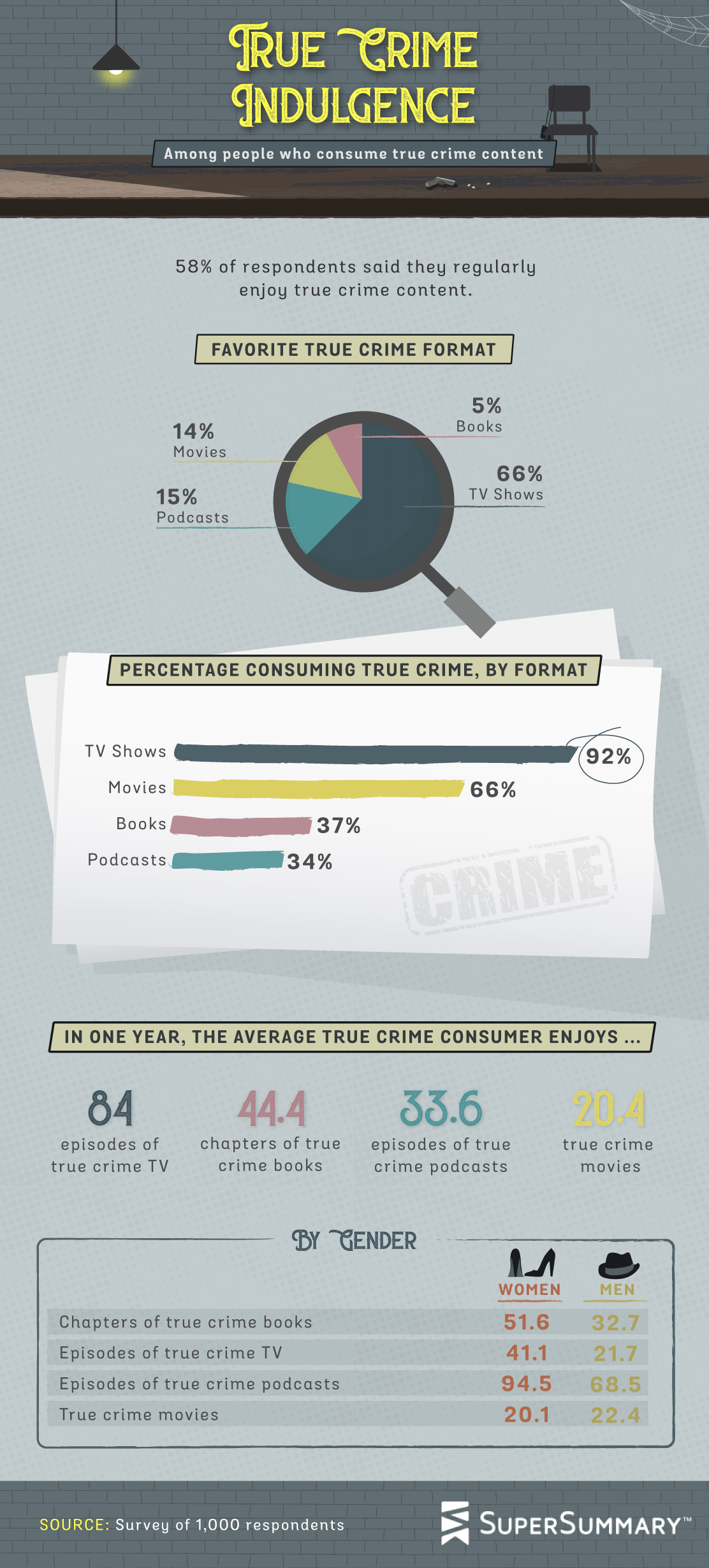
While true crime consumers have a variety of reasons behind their affinity for the genre, enjoyment of true crime is widespread and many of us just can’t get enough. In fact, 58% of respondents said they regularly enjoy true crime content, with TV shows dominating other formats. Compared to 15% who turned to podcasts, and 14% and 5% who preferred movies and books, respectively, 66% of respondents said their favorite true crime format was TV shows.
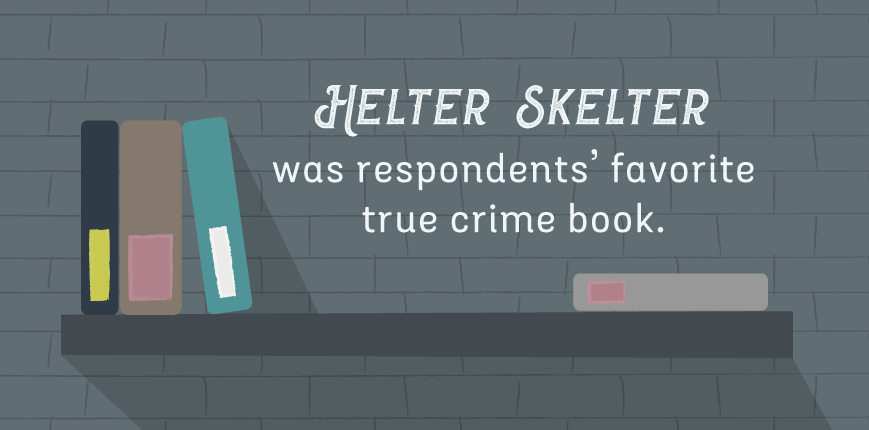
Podcasts may have ranked as the second favorite true crime format, but it was the medium with the fewest viewers – while 92% of respondents reported consuming true crime through TV, only 34% said the same of podcasts.
It seems like people don’t get enough of a fix from one format only, though. In one year, the average true crime consumer enjoys approximately 84 episodes of true crime TV, 44 chapters of true crime books, 34 episodes of true crime podcasts, and 20 true crime movies. And these numbers were even higher among women who consumed significantly more than their male counterparts. Compared to just 33 chapters of true crime books consumed by men, women read 52. Similarly, women listened to considerably more podcasts and an average of about 19 more episodes of true crime TV than men.
Research has found that women’s increased fear of crime in their daily lives piques their interest in true crime, and hearing real-life stories is their way of learning how to prevent becoming a victim. However, 42% of true crime consumers said the content decreased their faith in humanity, while 38% said it made them feel less safe in their daily life.
Drawn to the Deviant
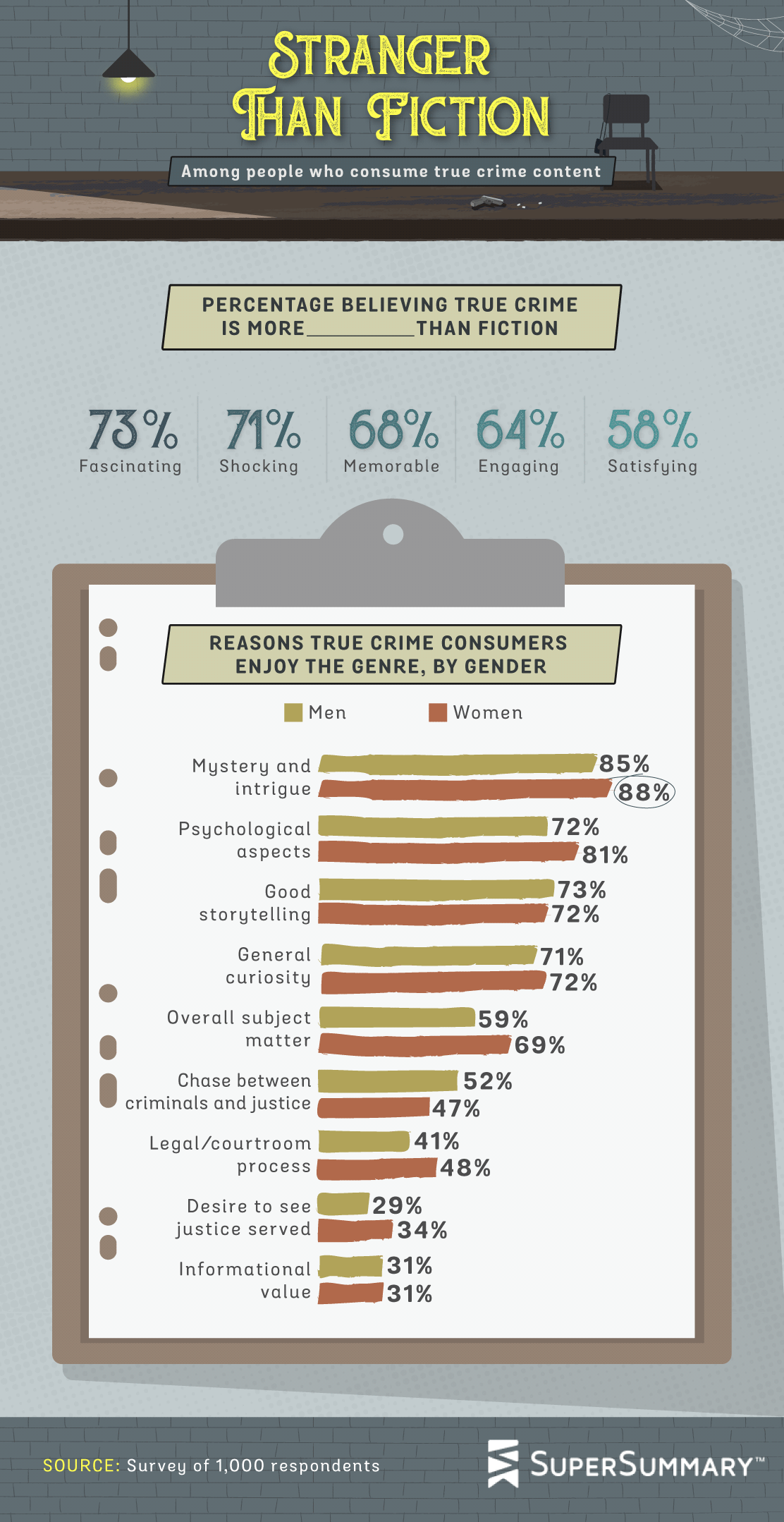 Seventy-three percent of consumers believed true crime was more fascinating than fiction. The majority also said true crime was more shocking, memorable, and engaging than fiction. But it isn’t just the fascinating and shocking aspects that make consumers obsessed with true crime; instead, 87% overall (85% of men and 88% of women) said they enjoyed the genre because of mystery and intrigue, while 78% (72% of men and 81% of women) named psychological elements as the main reason behind their enjoyment.
Seventy-three percent of consumers believed true crime was more fascinating than fiction. The majority also said true crime was more shocking, memorable, and engaging than fiction. But it isn’t just the fascinating and shocking aspects that make consumers obsessed with true crime; instead, 87% overall (85% of men and 88% of women) said they enjoyed the genre because of mystery and intrigue, while 78% (72% of men and 81% of women) named psychological elements as the main reason behind their enjoyment.

There’s no denying the positive aspects of true crime – giving people an insight into the human psyche and leading them to make safer decisions – but the genre can also invoke negative responses. Overexposure may increase anxiety, nightmares, and make consumers more paranoid and sheltered. In fact, 53% of true crime consumers said it made them more suspicious of other people, while 41% said it made them more worried about experiencing violence.
Criminal Curiosity
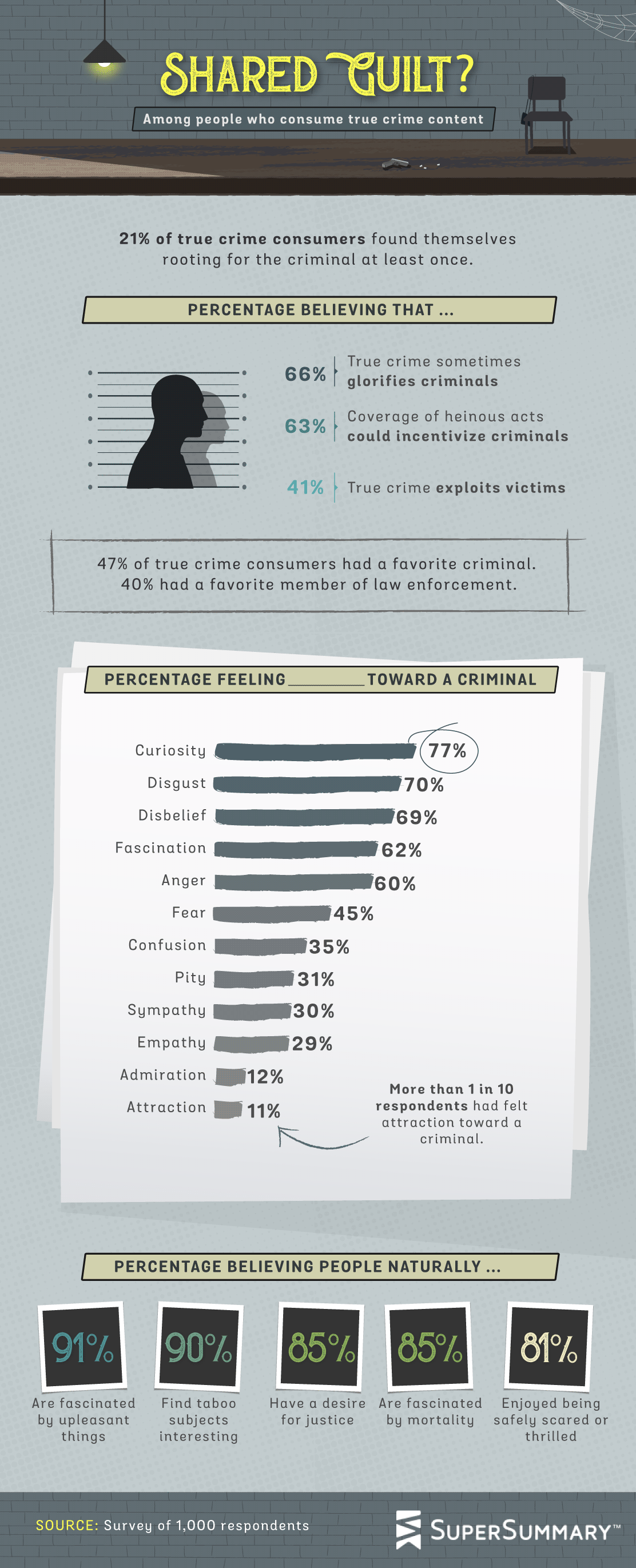
Getting an inside look into the deviant side of the human psyche may be intriguing, but it also taps into our empathy. Twenty-one percent of true crime consumers found themselves rooting for the criminal at least once, while 66% said true crime sometimes glorifies criminals. Talk about glorifying killers was especially prominent when Extremely Wicked, Shockingly Evil and Vile, the film focused on serial killer Ted Bundy, romanticized and sexualized one of America’s most notorious killers.
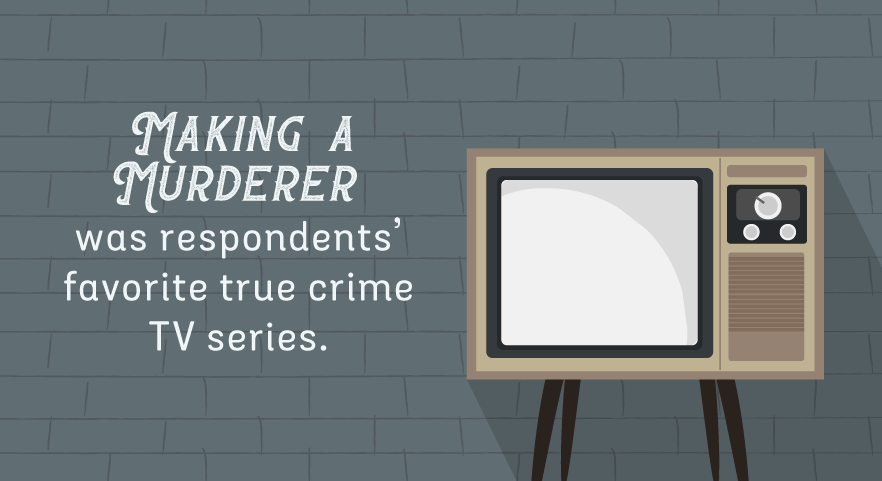
But even knowing the backstories of criminals and their heinous crimes, 1 in 3 true crime consumers had a favorite serial killer. Men were twice as likely as women to have had a favorite thief. Men were also more likely than women (almost twice as much) to admit that they’d admired a criminal. Nevertheless, 77% of people said they’d felt curiosity toward a criminal, while 70% and 69% said they had experienced disgust and disbelief, respectively. Consumers defended their true crime obsession, with the majority claiming that it was natural to be fascinated by unpleasant things or to find taboo subjects interesting.
What Could You Do If You Had To?
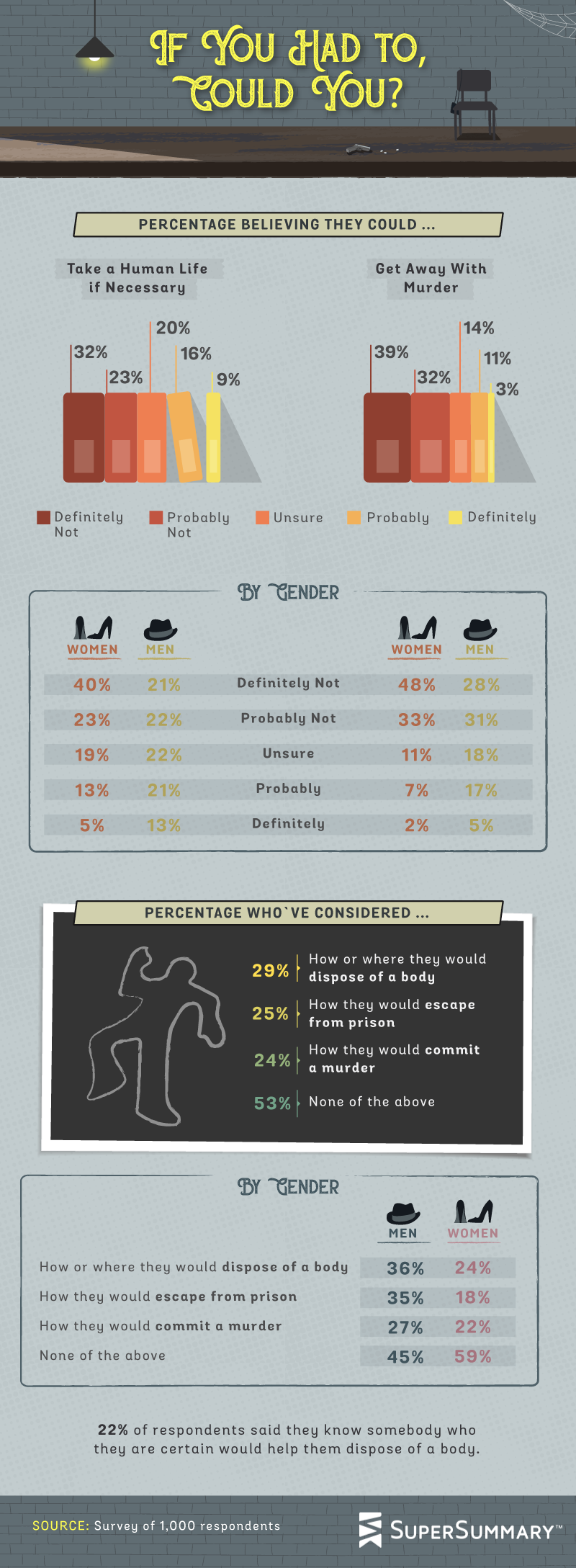
Natural interest aside, does an obsession with true crime desensitize people to the act of killing? Not entirely. When asked if they would be able to take a human life if necessary, 32% of true crime consumers said definitely not, while 23% said probably not. On the other hand, a shocking 16% of people said they believed they could probably take a human life, while 9% said they definitely could.
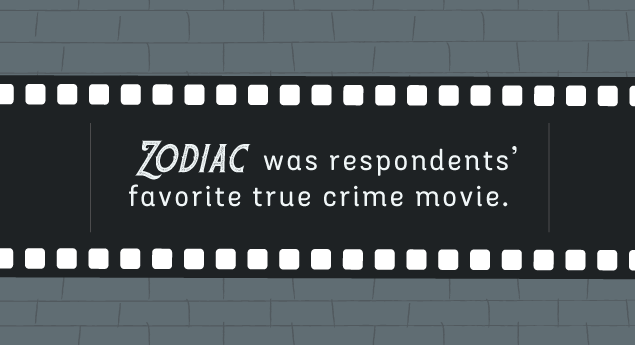
Killing is one thing; getting away with it is another. Respondents were less likely to think they could get away with murder: When posed with the scenario, 39% of true crime consumers said they definitely could not get away with murder, while 32% said probably not. Despite hours of studying true crime through books, TV, movies, and podcasts, only 3% of people were confident that they could definitively get away with murder. Interestingly, men were more likely than women to say they could take a human life if necessary and get away with murder, while the majority of women leaned toward “definitely not.”
Men were also more likely to consider other crime-related scenarios, like how or where they would dispose of a body, how they would escape from prison, and how they would commit a murder. While 53% of true crime consumers said they hadn’t considered any of the listed scenarios, women were 14 percentage points more likely than men to stray from thinking about being involved in such crimes.
A Deeper Look
Netflix released Conversations with a Killer: The Ted Bundy Tapes with a warning, urging viewers not to watch alone. Fortunately, for the true crime obsessed, there are plenty of people who share a love for dark, tantalizing drama. The mystery and psychological aspects of true crime lure people to TV shows, movies, books, and podcasts. Overall, true crime obsession seems to be simply human, driven by the natural fascination that unpleasant things can conjure.
Whether your preference lies in TV shows and movies or podcasts and books, there’s always more to the story than what is shown on the screen or written on the page. At SuperSummary, we think you should get the most out of the books you read. Our team of experienced teachers, professors, and literary scholars creates in-depth study guides, giving readers a deeper look into plots, characters, and themes. To browse our guides or learn more, visit us online today.
Methodology and Limitations
We surveyed 1,000 people using the Amazon Mechanical Turk service. To ensure that respondents took our survey seriously, all respondents were required to identify and correctly answer an attention-check question. Respondents classified as “true crime consumers” were respondents who selected true crime as one of the genres of entertainment that they regularly enjoyed. 752 respondents were true crime consumers, and 248 respondents did not consume true crime content. 569 respondents were female, 424 were male, and 6 did not identify as male or female. Survey quotas were used to ensure sufficient sample sizes, so these sample sizes are not proportional to the general population. Our margin of error was 3% with a 95% confidence interval.
In many cases, questions and responses were rephrased for clarity or brevity. These data rely on self-reporting, and strict statistical testing has not been performed on these findings. Potential issues with self-reported data include but are not limited to exaggeration, selective memory, and attribution errors on the part of respondents.
Fair Use Statement
Do you know someone who just can’t get enough true crime? They might be interested in learning more about the reasons behind their obsession. The graphics and content found here are available for noncommercial reuse, so feel free to share this project with your friends or followers. All we ask is that you include a link back to this page so that readers can get all the information and contributors receive proper credit.